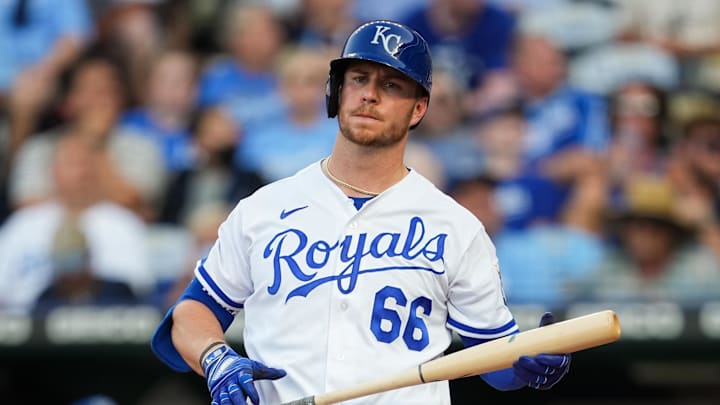The KC Royals, famous for doing things their own way regardless of logic or conventional baseball wisdom, continued marching to the beat of its own drummer Wednesday.
It wasn't that they formally announced the signing of pitcher Jordan Lyles, an acquisition we suggested in November they might make. Lyles makes some sense for Kansas City: he pitched decently for Baltimore last season and could be a nice addition to the Royals' rotation while their young starters continue to develop.
Instead, it was how the club cleared roster space for Lyles. In a move more surprising than the $1.4 million it gave him last month to avoid arbitration (he and Adalberto Mondesi are still the only arbitration-eligible Royals to settle on new deals), the team designated Ryan O'Hearn for assignment, giving Kansas City seven days to trade him, release him if he clears waivers, or assign him to the minors if he clears waivers and accepts the assignment.
What made the roster move surprising wasn't just that the Royals didn't DFA a pitcher to make room for the hurler they acquired. That happens occasionally. In this case, the club's apparent departure from its previously hard commitment to O'Hearn made it more unusual.
Remember, this is a franchise possessed by an infamous loyalty to non-performing players, an especially conspicuous flaw in O'Hearn's situation. His four-plus years in the majors include only one good season, his 2018 rookie campaign during which he hit 12 home runs and slashed .262/.353/.597 with a 154 OPS+ in 44 games. He's also hit .195 twice and owns a career 83 OPS+.
And wasting no time re-signing O'Hearn for next season merely confirmed the Royals' unwavering dedication to him.
Then came Wednesday and the DFA, a transaction typically signaling the end of a player's tenure with his team.
Don't, however, write O'Hearn off. His Royal days being over isn't such a safe bet.
The KC Royals may not be as ready to let Ryan O'Hearn go as it might seem.
Strong evidence that Kansas City isn't giving up on O'Hearn lies in that $1.4 million deal he signed last month. Although $1.4 million isn't a lot by big league standards, it's still enough to suggest the Royals' decision to re-sign O'Hearn wasn't cavalier; this is, after all, more of a penny-pinching franchise than most. Had O'Hearn not been in its plans, non-tendering him to save over a million bucks would have been the right move.
So, what might be happening here?
Simple. Kansas City had to make room for Lyles and clearly hadn't yet determined which of the 21 pitchers on its 40-man roster when it signed him might be expendable, a decision made a bit more complicated by the club's recent (and perhaps still ongoing) overhaul of its pitching brain trust. The Royals also apparently weren't ready to trade a position player or risk losing one on the waiver wire.
That left O'Hearn, who poses little risk of loss to a team that continually stands by him. Finding a trade partner willing to take a flier on him, especially for the $1.4 million one would have to pay him, may be next to impossible. And any club claiming him on waivers also picks up that salary obligation.
But the story doesn't end there. Because arbitration-avoiding contracts are guaranteed, the Royals must pay O'Hearn his $1.4 million even if they release him, and they typically don't throw money away unless they absolutely have to. If O'Hearn squeezes through waivers, however, the club can outright him to the minor leagues; O'Hearn, though, can refuse such an assignment, but becomes a free agent and loses that guaranteed money if he does. Don't expect that to happen: he's not likely to find a matching free agent deal.
The Royals, then, may well have foreseen this entire scenario when they re-signed O'Hearn, and are simply betting on no one having enough interest in him to pay his $1.4 million acquisition cost.
We shall soon see.
Ryan O'Hearn's Kansas City days may not be over.
